Culture and Society
The Faroe Islands are an archipelago located in the North East Atlantic Ocean half way between Scotland and Iceland. The country is a self-governing nation under the external sovereignty of the Kingdom of Denmark. The Faroe Islands are not a member of the European Union but has agreements on fisheries, trade in goods, and research cooperation with the EU.
There are about 120 towns and villages in the country scattered over 17 islands. Out of a total population of around 55,000, more than 22,000 live in the capital, Tórshavn.
Fishing and fish farming are the most important industries in the Faroe Islands. In recent years tourism has also become increasingly important.
The culture of the Faroe Islands has its roots in the Nordic culture. The islands were long isolated from the main cultural movements in Europe and have maintained a large part of their traditional culture. At the same time the Faroese live a modern European life with cultural events, new technology and a well developed infrastructure.
The official language of the Faroe Islands is Faroese but practically everyone can speak Danish and most people are capable of communicating in English too.
| Total land area | 1,393 sq km |
| Total marine area | 274,000 sq km |
| Latitude/longitude | 62°00′N 06°47′W |
| Islands | 18 (17 inhabited) |
| Highest peak | 882 m / 2894 ft |
| Time zone | GMT, summer time GMT +1 |
| Population | 55,146 (August 2025) |
| Official language | Faroese |
| Political system | Parliamentary democracy |
| Capital | Tórshavn |
| Parliament | Løgting |
| Territorial organization | 29 municipalities |
| Membership of EU | No |
| Prime minister | Aksel V. Johannesen |
| National day | July 29th (St. Olav’s Day) |
| Currency | Danish kroner (DKK) |
| Telephone country code | +298 |
| Internet country code | .fo |
| Electricity | 220V |
The Official Site of the Faroe Islands contains a wealth of information on various aspects of the Faroese society.
.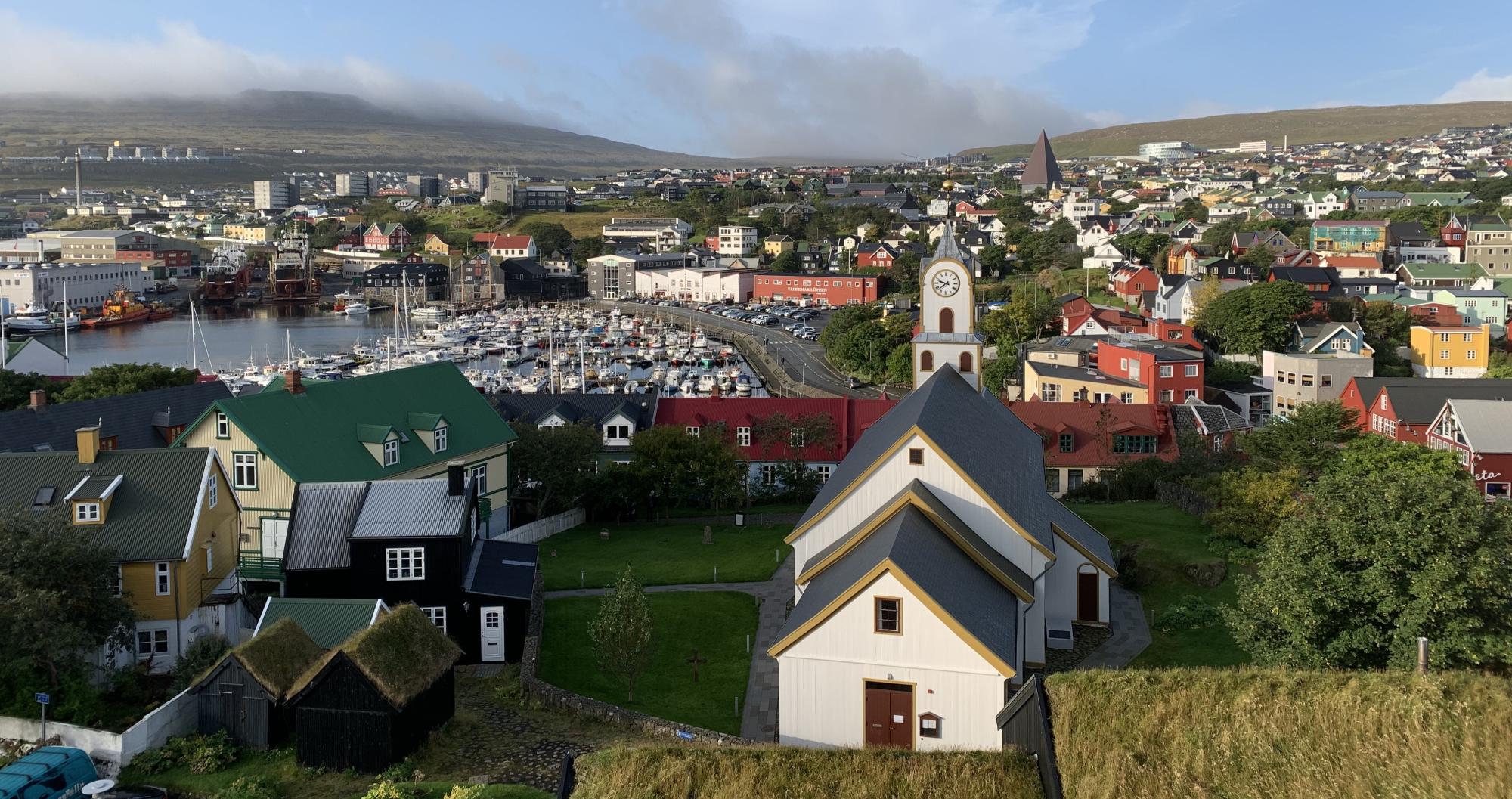
Political system
The Faroese political system is based on representative democracy. The legislative assembly is known as the Løgting. The executive government, Føroya Landsstýri, is headed by the Prime Minister, Løgmaður.
.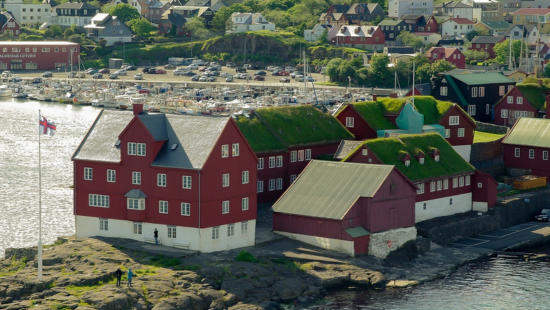
The Faroe Islands are believed to have been discovered and inhabited in the 8th century or earlier by Irish settlers. The Norwegian colonization began about a hundred years later and developed throughout the Viking Age.
Norway and Denmark joined in a double monarchy in the late 14th century. When Norway was seperated from Denmark in 1814, the Faroe Islands remained under the sovereignty of Denmark.
Due to the large geographical distance to Norway and Denmark the Faroe Islands have always maintained a special jurisdiction.
The Faroe Islands are a self-governing nation with extensive autonomous powers and responsibilites under the external sovereignty of the Kingdom of Denmark. The Faroe Islands have exclusive competence to legislate and govern independently in a wide range of areas, including for example the management of marine resources, trade, taxation, energy, transport, communications, social security, culture, education and research.
The status of the Faroe Islands within the Kingdom of Denmark was defined in the Home Rule Act of 1948. Amendments were made in 2005.
Faroese autonomy in foreign relations is provided by a treaty between the Faroe Islands and Denmark. This treaty allows the Faroe Islands to negotiate treaties under international law with other states and international organisations concerning all matters administered by the Faroese authorities.
Although Denmark is a member state of the European Union, the Faroe Islands have chosen to remain outside the Union. The Faroe Islands negotiate their own trade and fisheries agreements with the EU and other countries and participate actively in a range of international fisheries arrangements and organisations.
The Løgting is the legislative assembly for Faroese affairs.
The Løgting is believed to be one of the oldest parliaments in Europe. Its origin can be traced as far back as shortly after the first Norse settlement of the Faroe Islands in the early 9th century. The settlers established their own parliament in Tórshavn where all major decisions affecting the whole country were taken.
In 1816 the Faroe Islands became a Danish administrative district and the Løgting was abolished. In 1852 the Løgting was reestablished as a consultative body for Danish authorities concerning the governing of the Faroe Islands.
In 1948 the Home Rule Act invested all legislative power within branches taken over from the Danish Parliament in the Løgting.
The Løgting has 33 members who are elected for a period of four years. Election of the Løgting can take place before the end of an election period if the Løgting agrees on dissolving itself or the Prime Minister decides to call an election. All Faroese and Danish nationals over 18 years residing in the Faroe Islands have the right to vote and to stand for election for the Løgting.
At present six political parties are represented in the Løgting.
The session of the Løgting begins on 29 July (Saint Olaf´s day) with a procession from the parliament building to the Cathedral where a service is held. After the service the procession returns to the parliament, and the Prime Minister delivers his Saint Olaf’s address, in which he gives a general description of the state of the nation.
The sittings of the Løgting are public.The Løgting debates between 150 and 200 various items in one session.
Political parties The Social Democartic Party - Javnaðarflokkurin |
The Faroese Government – Landsstýrið - has the executive power in all areas for which the Faroe Islands have assumed responsibility.
Landsstýrið consists of the Prime Minister - løgmaður - and a number of ministers - landsstýrismenn. The Parliament appoints the Prime Minister, and the Prime Minister appoints the ministers.
The Government elected in September 2022 consists of the Social Democratic Party, the Republican Party, and the Progress Party. The Government is headed by Aksel V. Johannesen and has eigth ministers.
The Faroe Islands are administratively divided in 29 municipalities - kommunur - with about 120 towns and villages. The municipalities vary in size from around 23,000 inhabitants in Tórshavn Municipality to around 40 inhabitants in Skúvoy Municipality.
The municipal councils are elected for a period of four years. All Faroese/Danish nationals over 18 years registered in the Faroe Islands and citizens of other countries who have been residing in the Faroe Islands for three years prior to an election have the right to vote and stand for election in municipal elections.
Two Faroese representatives are elected for the Danish Parliament - Folketinget. All Faroese and Danish nationals over 18 years residing in the Faroe Islands have the right to vote and stand for elections for the Danish Parliament.
Infrastructure
The Faroe Islands have a modern infrastructure with roads, tunnels, bridges and subsea tunnels connecting most of the islands.
Regular flights and car and cargo ferries are available all year round for transport of people and goods to and from the Faroe Islands.
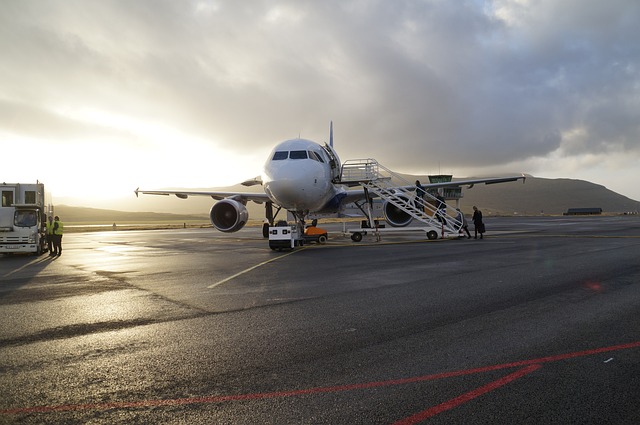
The roads are the main transport artery of Faroese society. The public transport system is well established but the preferred means of transportation is still the car.
Buses and ferries
The public transport system consists of an extensive network of buses and ferries connecting towns, villages and islands throughout the country. The public transport company, Strandfaraskip Landsins, operates the bus and ferry service.
Helicopters
Regular helicopter service to the outer islands is operated by the Faroese airline company, Atlantic Airways.
Urban buses
In Tórshavn and Klaksvík there are urban bus services free of charge.
Flights
There are several daily flights to the Faroe Islands from Copenhagen, and regular flights to other destinations in Denmark, Iceland, Norway, United Kingdom, Spain and France.
ATLANTIC AIRWAYS SAS WIDERØE ICELANDAIR
Ferries
There is a direct ferry link to Denmark (Hirtshals) and Iceland (Seyðisfjørður).
Communication
The Faroe Islands have a highly developed telecommunications infrastructure with high-speed internet.
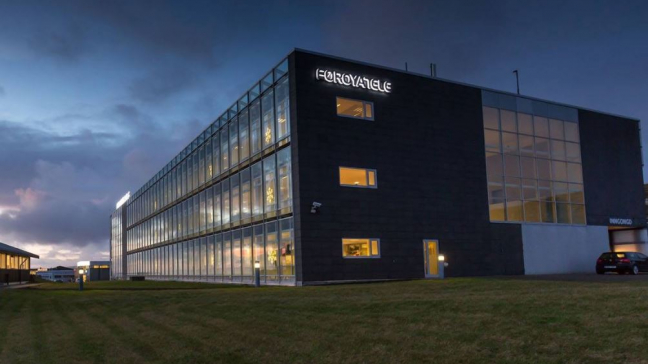
The Faroe Islands have an advanced telecommunications network with high-speed internet connections across the entire country to even the most remote islands.
Subscriptions for fixed line and mobile telephones and broadband internet connection are available from Faroese telecommunication companies.
The postal service is operated by the national postal company, Posta.
There is daily postal transport to and from the Faroe Islands, and domestic post is delivered twice a week.
Post offices are in larger towns and villages around the islands.
The Faroese media landscape consists of the National Faroese Broadcasting Company, as well as a number of private radio stations, news portals, newspapers and magazines.
The National Faroese Broadcasting Company - Kringvarp Føroya - transmits Faroese radio and TV programmes as well as Danish and Norwegian TV programmes and other TV programmes with Danish subtitles.
Televarpið - a subsidiary company of Føroya Tele - offers a wide range of Nordic and international TV channels broadcasted via digital terrestrial network and via internet.
Religion
Religion plays an important role in Faroese culture. According to the constitution, everyone is entitled to associate in communities to worship according to his or her convictions.

The majority of the Faroese population, about 85 percent, belong to the Faroese Evangelical Lutheran Church. The Faroe Islands are a diocese with a bishop, a dean and 21 ministers. There are 14 parishes with a total of 62 churches.
The Faroese Evangelical Lutheran Church has several organisations and associations attached to it, among them KFUK and KFUM which correspond to YWCA and YMCA.
The Plymouth Brethren are the second largest religious community in the Faroe Islands. About 13 percent of the population belong to this community. The community has houses of worship in towns and villages around the islands.
EBENEZER EVANGELICAL CHURCH
Other religious communities in the Faroe Islands include the Roman Catholic Church , the Pentecostal Movement, the Salvation Army, the Seventh Day Adventists, Jehovah´s Witnesses, and the Bahá’í Faith.
Leisure
The Faroe Islands have a rich and thriving contemporary culture. Traditional culture lives along with modern cultural events, and all kinds of sports and music activities are very popular.
.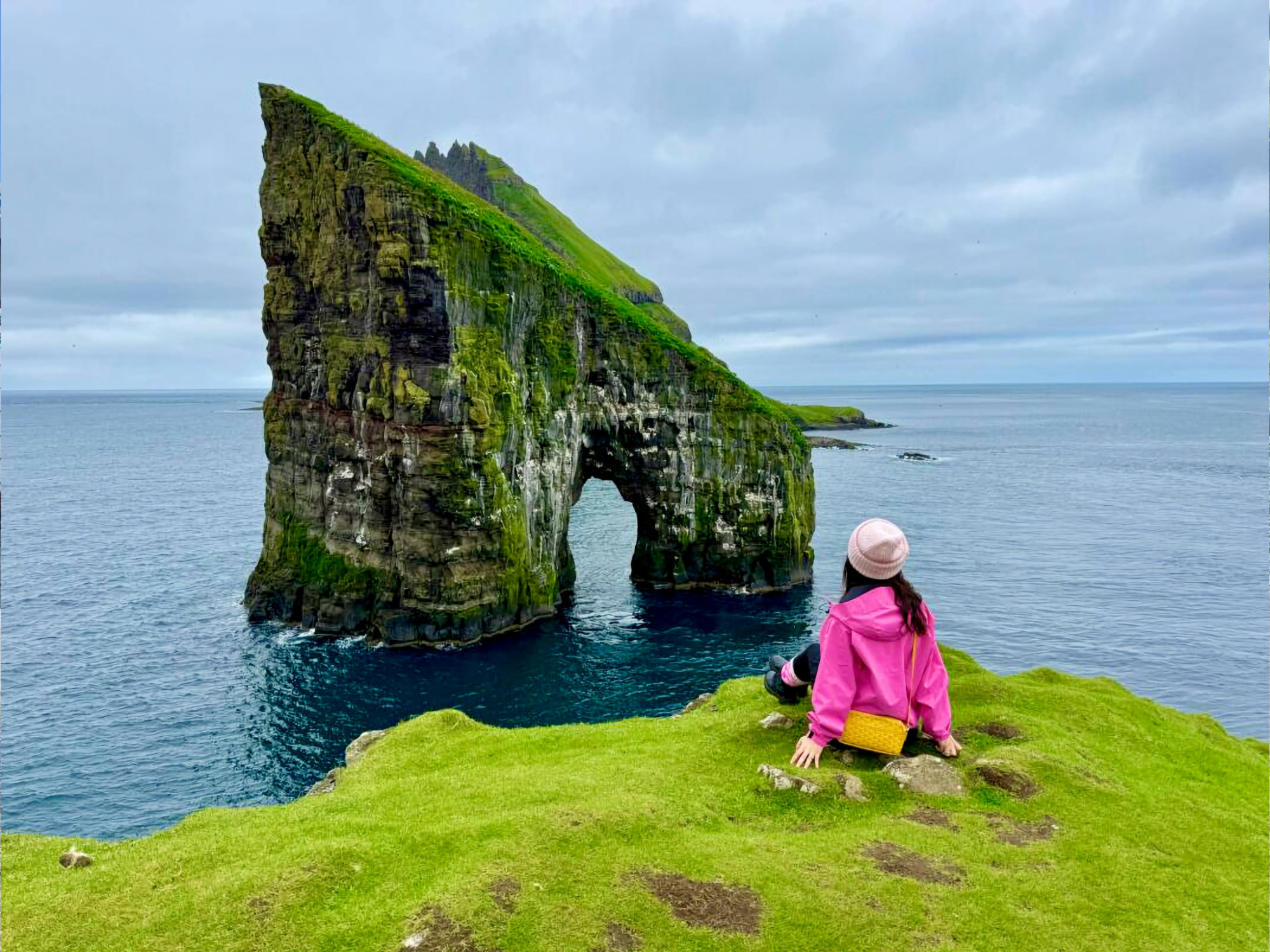
The Faroese restaurant culture has changed drastically within the last decade and new restaurants are consistently emerging. Restaurants offer a variety of local food as well as cuisine from around the world.
The taste of the traditional food is primarily determined by the preservation methods used, which especially include the maturing and drying of meat and fish. The most popular treat is well-aged wind-dried mutton - skerpikjøt. Other traditional foods are semi-dried mutton - ræst kjøt, and matured fish - ræstur fiskur.
Dried lamb and fish and other traditional products are still very popular in the Faroe Islands and it is becoming increasingly more common to adapt traditional Faroese food for fine dining.
The people of the Faroe Islands are very fond of sports, both as a way of exercising and for leisure.
Football, handball and gymnastics are amongst the most popular sports activities.
Boat racing - kappróður - is the national sport of the Faroe Islands.
The pleasure derived from music is immense in the Faroe Islands. Almost every occasion is an opportunity to sing and play.
Artists
Several Faroese artists across different music genres deliver high class performances on the islands and abroad. Among the most notable Faroese artists who have gained recognition on the international stage are Eivør, Teitur, and Týr.
Choirs
Singing in choir is very popular. There are several excellent choirs around the islands for male, female and mixed voices.
Chain dance
The chain dance with epic ballads about heroes and legends is one of the most unique Faroese cultural features. It was originally a medieval ring dance in many European countries but has survived only in the Faroe Islands. Here it is still a prominent part of the Faroese cultural and musical life and is refered to as Faroese dance.
Music schools
Music schools are very popular, and many children are learning to play a variety of musical instruments. There are 13 music schools located around the islands.
The Faroese art history is comparatively young but the quality of Faroese art is remarkably high, and the Faroe Islands have fostered several great painters.
The National Gallery of the Faroe Islands - Listasavnið - features a permanent exhibition of older and modern Faroese artists as well as traveling exhibitions of foreign artists and special showcase exhibitions of Faroese artists.
Professional and amateur actors perform Faroese and international theatre plays at a high standard.
The National Theatre of the Faroe Islands - Tjóðpallur Føroya - performs Faroese drama and the best of modern and classic drama from abroad. It stages an average of four productions a year and has managed to stage new Faroese plays on a regular basis.
The Playhouse Theatre in Tórshavn - Sjónleikarhúsið - hosts a variety of plays and cultural performances.
The Nordic House - Norðurlandahúsið - offers a wide range of events all year round, including concerts, exhibitions, and theatre performances.
Hiking in the mountains has become an increasingly popular activity in the Faroe Islands. Even a short hike offers numerous vantage points overlooking magnificent and untouched nature.
It is also possible to join hiking clubs.
There are plenty of opportunities for sports fishing in the Faroe Islands by boat or from shore.
Fishing at the pier or the coast is generally permitted and free for everyone.
Freshwater fishing for salmon from lakes is permitted from around May to August and requires a fishing licence from the Faroese Fishing Association.
Evening schools under the administration of the municipalities around the country offer a wide variety of courses, such as cookery, photography, sewing, arts and crafts, creative writing, acting and genealogy studies.
There are several recurring cultural events that are very popular amongst the people of the Faroe Islands.
Music festivals
Several music festivals and concerts are held in the summer with a variety of local music in all genres and internationally acclaimed artists.
Local festivals
Local festivals - stevnur - with sports, concerts, and various other activities for all ages are held around the country during the summer. These festivals take place annually starting in Klaksvík, Runavík, Sundalagið and Suðuroy in June and in Fuglafjørður, Vágar, Skálafjørður and Vestmanna in July. The traditional rowing competition is a main attraction at these festivals.
St Olaf´s Wake
The national holiday of the Faroe Islands, St Olaf´s Wake - ólavsøka - is held in Tórshavn on July 28th and 29th. People from all over the islands gather in the capital to celebrate the national holiday which is also a cultural and sports festival with rowing, football matches, art exhibitions, concerts, and chain dance.
St Olaf´s Wake starts on July 28th with a procession of sports people and horse riders and an opening ceremony in front of the parliament building. On July 29th the Løgting opens it session after the summer holiday with a procession and a service at the Cathedral in Tórshavn.
